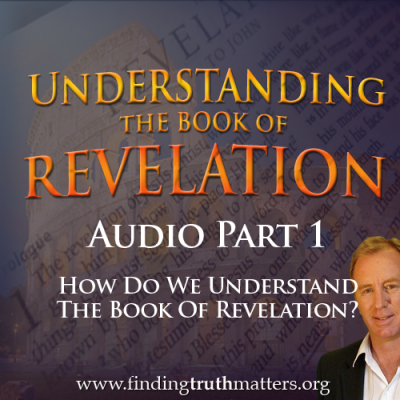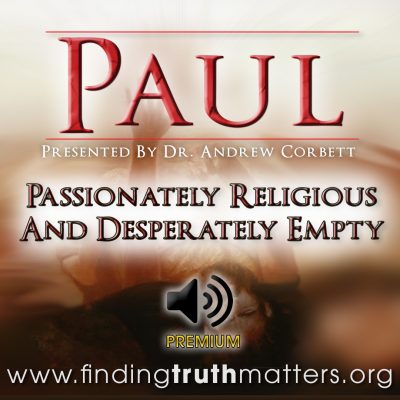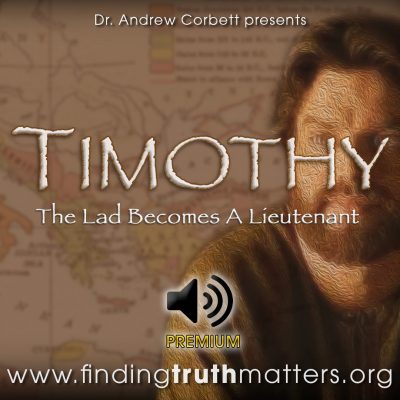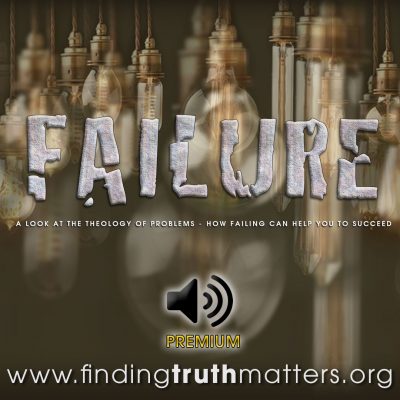I Doubt, Part 3
I DOUBT THE BIBLE
Doubt is not incompatible with Christianity. Honest doubt actually leads to exploration and investigation of truth-claims which is a necessary step toward discovering the truth. One of the most doubtful claims of Christianity is that its central source of teaching, the Bible, is divinely inspired and without error. If it is the case that the Bible is not divinely inspired or without error, then Christianity is false and without foundation.
The relationship between Christianity and the Bible is difficult to overstate. Conversely, the level of doubt that many have about Christianity is ironically often due to similar levels of doubt about the Bible! Christians believe that the Bible is the divinely inspired Word from God to mankind. Because it is divinely inspired, Christians therefore believe that the Bible is inerrant (without error). Sceptics, however, scoff at these beliefs and question how anyone could believe a man was made from dirt, or how another man took two of every kind of animals onto an ark as the world was flooded, or how someone defied a world Emperor by summoning a plague of flies!
About The Bible
 The Bible is unique among the world’s religious holy books partly due to it being a story. While it has sections consisting of wisdom literature, law, the prophets and history, it is all part of a coherent story.
The Bible is unique among the world’s religious holy books partly due to it being a story. While it has sections consisting of wisdom literature, law, the prophets and history, it is all part of a coherent story.
The Bible makes several unique claims about itself. These include its divine inspiration (2Tim. 3:16-17) and that it is without error (2Sam. 7:28; 22:31; Psa. 18:30; Prov. 30:5). Apart from these unique claims, the Bible is unique because of what it claims .
-
It claims how the universe began (Gen. 1:1);
-
Who began it (Gen. 1:1; Col. 1:16);
-
The origin of humanity (Gen. 2);
-
Why there is evil/tragedy/heartache (Gen. 3);
-
How God began to redeem mankind (Gen. 3);
-
How God sent His Son to earth as a human who died for the sins of humanity as our Substitute (John 3:16);
-
How His plan would be carried out through human history (Eph. 1:10; 3:9);
-
How the world will end (Rev. 21:1);
-
What life beyond the grave will look like for all the redeemed and all those who reject God’s offer of forgiveness and redemption – the condemned (Jn. 5:24; Rev. 20).
WHY SOME PEOPLE DOUBT THE BIBLE
The Bible is just a book written by men.
 It’s easy to see why this criticism is so popular amongst sceptics since the Bible was written by men — well, sort of. If it could be shown that the Bible is merely the imaginative product of various men down through the ages who pretended to write on behalf of God which was then ultimately edited and compiled by some other source some centuries later, then its claims to divine inspiration are highly questionable.
It’s easy to see why this criticism is so popular amongst sceptics since the Bible was written by men — well, sort of. If it could be shown that the Bible is merely the imaginative product of various men down through the ages who pretended to write on behalf of God which was then ultimately edited and compiled by some other source some centuries later, then its claims to divine inspiration are highly questionable.
But this criticism betrays a misunderstanding of what the divine inspiration of Bible involved. The Bible’s divine inspiration was not given by mechanical dictation — the idea that God dictated word-for-word to those He used to write the Scriptures. Rather, the divine inspiration of the Bible is referred to as verbal plenary inspiration. This involved God using the vocabulary (idioms, terminologies, perspectives) of those He inspired to ensure that everything they wrote by inspiration was His Word. This is why it’s more accurate to regard the Bible as having been penned by men rather than written by men.
The Bible is full of mistakes and errors
 Sceptics often claim that the Bible is full of mistakes and errors which undermines its claim to inerrancy (being without error). Examples of this, sceptics point out, include biblical expressions such as sunrise which is clearly an error since the sun does not rise (because the earth rotates giving the appearance of the sun rising). Other examples include incorrect geographic expressions such as ‘up’ (when the traveller actually headed south) and ‘down’ when the traveller actually headed ‘north’ (Matt. 20:17 – And as Jesus was going up [heading south from Galilee] to Jerusalem, He took the twelve disciples aside, and on the way He said to them).
Sceptics often claim that the Bible is full of mistakes and errors which undermines its claim to inerrancy (being without error). Examples of this, sceptics point out, include biblical expressions such as sunrise which is clearly an error since the sun does not rise (because the earth rotates giving the appearance of the sun rising). Other examples include incorrect geographic expressions such as ‘up’ (when the traveller actually headed south) and ‘down’ when the traveller actually headed ‘north’ (Matt. 20:17 – And as Jesus was going up [heading south from Galilee] to Jerusalem, He took the twelve disciples aside, and on the way He said to them).
This criticism fails to appreciate that divine inspiration and inerrancy of the Bible accommodates the human perspectives of its penmen — such as their use of the term ‘sunrise’ — and how the expression ‘going up’ can encompass topography or proceeding to Jerusalem (from any direction) due to the high spiritual regard with which Jerusalem was held.
It’s full of contradictions
From the outset of the Bible it appears that there is an immediate contradiction between Genesis chapter 1 and 2 which seem to have two completely different accounts of the creation story. Upon closer inspection though, there aren’t two contradictory accounts of creation – rather, there are two complementary perspectives which correspond to each other in a complementary fashion. Genesis chapter 1 is from the perspectives of outer space, then a primordial earth with an opaque atmosphere, then an earth with a translucent atmosphere. Genesis chapter 2 is written from the perspective of where Adam and Eve were created and then the originally unplanted Garden of Eden.
The Bible seems to contradict itself about whether all people are sinners or some might be sinless. On the one hand, the Bible says that there is no one righteous (Ecclesiastes 7:20; Romans 3:23), yet on the other hand, it states that Noah was blameless (Genesis 6:9) and so was Job (Job 1:1). Added to this, the New Testament states that when a person becomes a Christian they become sinless (1John 5:18; 3:6; 3:9). But rather being contradictory, each of these verses describe the various perspectives of human sinfulness and righteousness. Compared to the righteousness of God, no human is righteous! Compared with the vilely wicked people of their generations, Noah and Job were “blameless.” And when a sinner turns to Christ, and receives the forgiveness that God offers, their sins are washed away and God now sees them in the sinless Christ.
Some claims of Biblical contradictions stem from misunderstandings about: (i) Human perspective accurately recorded (Acts 9:7 compared with Acts 22:9); (ii) Episodes of disobedience accurately recorded (Exodus 20:13 compared with Gen. 34:25); (iii) complementary accounts where some details are omitted or added in one of the accounts (Mark 10:46 compared with Matt. 20:29-34).
It’s full of myths and legends
Snakes that tempt; donkeys that talk; city walls that all crash outward after a batch of nomads march around them; giant fish that swallow and transport wayward prophets; a virgin girl gives birth to a son; this son grows into a man who walks on water; this same man in executed and buried then rises from dead three days later; ten days later ascends from earth into the clouds—all sound fantastical, or mythological. Sceptics often cite the maxim: Extraordinary claims require extraordinary proof! But this maxim is not true because extraordinary claims only require adequate proof. Several of these seemingly unbelievable claims have eye-witness testimony support or better. For example, the death of Jesus was witnessed by scores of people. His burial was conducted by soldiers who secured and sealed the tomb. His resurrection appearances were witnessed by 500 people at one time and several groups of others at various times – and most dramatically by several ardent sceptics!
that He was buried, that He was raised on the third day in accordance with the Scriptures, and that He appeared to Cephas, then to the twelve. Then He appeared to more than five hundred brothers at one time, most of whom are still alive, though some have fallen asleep. Then He appeared to James, then to all the apostles. Last of all, as to one untimely born, He appeared also to me.
First Corinthians 15:4-8
It’s out-dated and full of unenlightened, non-scientific, superstitious nonsense
The Bible invokes supernatural explanations in a way that sounds like a series of ‘God of the gaps’ explanations. This makes the Bible’s account of the universe’s origin, the origin of humankind, and how the natural world functions, sound more like superstition than scientifically rational explanations. But there are several reasons to challenge this criticism. The latest in scientific findings, such as Big Bang cosmology, the fine-tuning of the universe’s order levitra dosage expansion rate, the origin of humanity from a single man and single woman, each correspond to what the Bible teaches.
It’s been changed down through the ages from what it originally said
This criticism lacks credibility now in the light the sheer manuscript evidence which dates back to the second and early third centuries. There are over 5,000 such manuscripts which correspond to what we have today which shows that the Bible has not been changed from its original form. Added to this was the discovery of Dead Sea Scrolls which unearthed manuscripts of the Old Testament which dated from several hundred years before Christ which demonstrate that the prophecies about Christ found in the book of Isaiah were not, as had been alleged, added after the life of the Christ to give the appearance that He fulfilled ancient prophecies.
THE BIBLE CLAIMS TO BE WITHOUT ERROR
One of the reasons that the Bible invokes so much doubt from sceptics is its emphatic claim that it is God’s authoritative revelation to mankind and is without error. Because we have so many ancient manuscripts of the Biblical texts, scholars are readily able to discern where ‘scribal errors’ (such as mis-spelling of words) have occurred and therefore like to point out that biblical inerrancy describes the original autographs of the biblical books. Yet, and even remarkably, the Bible is translatable into any language and even in its accepted translated forms today bears an amazing authenticity to its original manuscripts. Thus, the Bible declares of itself –
All Scripture is breathed out by God and profitable for teaching, for reproof, for correction, and for training in righteousness, that the man of God may be complete, equipped for every good work.
Second Timothy 3:16-17
This God—His way is perfect; the Word of the LORD proves true; He is a shield for all those who take refuge in Him.
Psalm 18:30
THE BIBLE CLAIMS TO BE DIVINELY INSPIRED
The case for the divine inspiration of the Bible might be summarised by these five points:
1. Its consistent claim is that it is the inspired Word of God
If the Bible was the divinely inspired Word of God to mankind, it would be an incredibly odd thing if it failed to mention or to assert this claim. But it consistently does.
¶ And the LORD said to Moses, “Write these words, for in accordance with these words I have made a covenant with you and with Israel.”
Exodus 34:27
2. Its message is consistent despite being penned by around 40 authors from at least three continents (Africa, Europe and Asia)
The Bible is not one man’s revelation. It is the consistent testimony of at least 40 different authors from at least 3 continents who penned their revelations from God over a period of at least 1500 years—yet all bear a consistent and complementary message about God’s plan of redemption. This is not just extraordinary, it’s positively unique among the religious texts of humanity!
3. Many of its historical claims have been confirmed (not contradicted) by archaeology
 If the Bible was divinely inspired and yet its historical claims and details (topographical descriptions, place names, people groups) could not be historically corroborated either through records or archaeology, it would be highly suspect and subject cynical dismissal. But no such accusation can be substantiated and many of ancient historical accounts have been confirmed by archaeology unlike many other religious texts such as, for example, the Book of Mormon.
If the Bible was divinely inspired and yet its historical claims and details (topographical descriptions, place names, people groups) could not be historically corroborated either through records or archaeology, it would be highly suspect and subject cynical dismissal. But no such accusation can be substantiated and many of ancient historical accounts have been confirmed by archaeology unlike many other religious texts such as, for example, the Book of Mormon.
4. Its date-specific prophecies have been fulfilled (particularly the longest Messianic prophecies given in Isaiah 52-53).
¶ Behold, My servant shall act wisely;
He shall be high and lifted up,
and shall be exalted.
As many were astonished at You—
His appearance was so marred, beyond human semblance,
and His form beyond that of the children of mankind—
Isaiah 52:13-14
He was despised and rejected by men,
a man of sorrows, and acquainted with grief;
and as one from whom men hide their faces
He was despised, and we esteemed Him not.
¶ Surely He has borne our griefs
and carried our sorrows;
yet we esteemed Him stricken,
smitten by God, and afflicted.
But He was pierced for our transgressions;
He was crushed for our iniquities;
upon Him was the chastisement that brought us peace,
and with His wounds we are healed.
Isaiah 53:3-5
The Isaiah 52-53 prophecy about Jesus, given in the 8th century BC, is one of the most remarkable in the Bible. It so accurately predicts the details of Christ’s life, ministry, death, and resurrection, that many sceptics dismissed it as having been written after the event as a pseudepigrapha (a fraudulent usage of Isaiah’s name). But then the Dead Sea Scrolls were discovered in 1946 and the copy of the Isaiah Scroll was dated to at least 300BC which proved beyond reasonable doubt that the messianic prophecies of Isaiah preceded the coming of Jesus of Nazareth. Added to this are Christ’s remarkably detailed prophecies concerning the destruction of Jerusalem within the lifetime of His audience (Matthew 24, given in 30AD) and their precise fulfilment in A.D. 70.
5. Its experiential claims can be put to the test — especially its claim of forgiveness of sins through repentance and turning to Christ.
 While the first four points in the case for accepting the divine inspiration of the Bible are rather rational, this point is immensely practical, testable, and experiential. The Bible presents an amazing diagnosis of the human condition and an even more remarkable remedy for it. All of us are infected with a naturally incurable disease that neither science, philosophy, religion, or human attainment can treat. This disease profoundly effects the human soul and leads to anger, frustration, conflict, and depression. It creates a sense of emptiness, loneliness, and unsatisfied longing. All of these are mere shadows of the looming eternal reality of being condemned forever to the consequences of our own self-deceit and arrogance. Yet, the God of the Bible has sent His only Son to bear the weight of these eternal consequences and lay down His life as our substitute and to offer us eternal forgiveness and acceptance by God the Father. God has done all this at an infinite cost to Himself because He loves us and wants us to be set free and eternally cured from this disease of the soul.
While the first four points in the case for accepting the divine inspiration of the Bible are rather rational, this point is immensely practical, testable, and experiential. The Bible presents an amazing diagnosis of the human condition and an even more remarkable remedy for it. All of us are infected with a naturally incurable disease that neither science, philosophy, religion, or human attainment can treat. This disease profoundly effects the human soul and leads to anger, frustration, conflict, and depression. It creates a sense of emptiness, loneliness, and unsatisfied longing. All of these are mere shadows of the looming eternal reality of being condemned forever to the consequences of our own self-deceit and arrogance. Yet, the God of the Bible has sent His only Son to bear the weight of these eternal consequences and lay down His life as our substitute and to offer us eternal forgiveness and acceptance by God the Father. God has done all this at an infinite cost to Himself because He loves us and wants us to be set free and eternally cured from this disease of the soul.
For there is no distinction between Jew and Greek; for the same Lord is Lord of all, bestowing His riches on all who call on him. For “everyone who calls on the name of the Lord will be saved.”
Romans 10:12-13
Calling on the name of the Lord simply means to talk to God and to ask Him for forgiveness and healing for our soul. If you feel the ache that I have just described, then I invite you to make this prayer and see what God does in your life.
“God, please forgive me and cleanse my soul from the sin that separates me from You. Help me to know you and to learn to love You and to increasingly learn how much You love me. Teach me what I need to know and lead me deeper into the truth, I pray; Amen.”
If you’ve made that your prayer, then you’ll find, as millions of others have as well, that the answers to these prayers are found in reading the Bible. I suggest you start with the Gospel of John in the New Testament by reading one chapter a day then continue reading at least one chapter a day as you make your through to the end of the New Testament. And if you do, I’d love to hear from you.
© Dr. Andrew Corbett, September 2019
2 Comments
Submit a Comment
-
Sale!

Understand The Book Of Revelation, Part 1 (Radio Edition)
Original price was: $1.25.$0.00Current price is: $0.00. -
Sale!

Living By Virtue, Part 4 – By Virtue of Generosity
Original price was: $1.25.$0.00Current price is: $0.00. -
Sale!

Paul Part 1, Premium Audio
Original price was: $1.75.$0.00Current price is: $0.00. -
Sale!

Timothy Part 2, Premium Audio
Original price was: $1.75.$0.00Current price is: $0.00. -
Sale!

The Problem Of Failure, Premium Audio
Original price was: $1.75.$0.00Current price is: $0.00. -

The God Series Part 6 – God The Father, Premium Audio
$0.00
Articles
Read articles about ethics, apologetics, philosophy, public policy discussions here
Audio Archives
Listen to or download hundreds of teaching audios. Search by categories, topics and Scripture passages.
Teaching Videos
View hundreds of teaching videos here. Invite a ‘virtual’ guest speaker by using these videos.
Free Resources
Choose from hundreds of Printable, free, and downloadable, Bible Studies, and Sermon Powerpoints/Keynotes.







































I si greatgull to meet man like you, is God’s grace.. So that,we have problèms with dispensationistes view of prophetics scriptures. I explained some Brooks like fatalidm from Dr Hodge, Christ in you, at present your articles,we have thé serius problèms in bibl’se interprétation withthe view of dispensationistes.is he possible that some body to meet you in bible school for the training? Because in Africa all pentecostals have the view of double reference in biblical interpretation of propheties. If there is dôme mistake i use french keybood.
Merci Jean.